Euroacademia Conferences
 Europe Inside-Out: Europe and Europeanness Exposed to Plural Observers (9th Edition) April 24 - 25, 2020
Europe Inside-Out: Europe and Europeanness Exposed to Plural Observers (9th Edition) April 24 - 25, 2020 Identities and Identifications: Politicized Uses of Collective Identities (9th Edition) June 12 - 13, 2020
Identities and Identifications: Politicized Uses of Collective Identities (9th Edition) June 12 - 13, 2020 8th Forum of Critical Studies: Asking Big Questions Again January 24 - 25, 2020
8th Forum of Critical Studies: Asking Big Questions Again January 24 - 25, 2020 Re-Inventing Eastern Europe (7th Edition) December 13 - 14, 2019
Re-Inventing Eastern Europe (7th Edition) December 13 - 14, 2019 The European Union and the Politicization of Europe (8th Edition) October 25 - 26, 2019
The European Union and the Politicization of Europe (8th Edition) October 25 - 26, 2019 Identities and Identifications: Politicized Uses of Collective Identities (8th Edition) June 28 - 29, 2019
Identities and Identifications: Politicized Uses of Collective Identities (8th Edition) June 28 - 29, 2019 The European Union and the Politicization of Europe (7th Edition) January 25 - 26, 2019
The European Union and the Politicization of Europe (7th Edition) January 25 - 26, 2019 7th Forum of Critical Studies: Asking Big Questions Again November 23 - 24, 2018
7th Forum of Critical Studies: Asking Big Questions Again November 23 - 24, 2018 Europe Inside-Out: Europe and Europeanness Exposed to Plural Observers (8th Edition) September 28 - 30, 2018
Europe Inside-Out: Europe and Europeanness Exposed to Plural Observers (8th Edition) September 28 - 30, 2018 Identities and Identifications: Politicized Uses of Collective Identities (7th Edition) June 14 - 15, 2018
Identities and Identifications: Politicized Uses of Collective Identities (7th Edition) June 14 - 15, 2018
Noumenism
-
-

-
Presentation speakers
- Heidi Dinkler, New York University, USA
- Download presentation
Abstract:
In this essay I make a case for a return to transcendence in art. I begin by defining our current moment as one of subject-generated and relative meaning. This analysis is derived both from the pervasive competition of a neoliberal economic system, and the shift in art from artist-generated meaning to spectator-generated meaning. I suggest that in relationship to this shift from external to internal meanings is a shift from transcendence to immanence. Immanence here defined is the experience of an unmediated “real” that is contained within the subject, a functional opposite of transcendence as it is traditionally defined: as a stepping outside of the self. While art has historically sought transcendence, art of the 21st century is more likely to seek immanence through abjection and immediacy, or displace meaning in art entirely through “open” and free form artworks. As an alternative I propose a Noumenist art that seeks a new transcendence through a reconsideration of alternative forms of knowledge. This transcendence would be an encounter with “noumena”—a border concept used by Immanuel Kant to described pre-representational reality. I expand on this concept through the writings on numen put forth by Rudolf Otto and Carl Jung, and examinations of belief made by William James. I suggest that Noumenist art allows for self-reflectivity, empathy, and hope, by opening a pathway to experiences of unmediated reality contained outside the self.
-
Related Presentations

European Cities and New Inhabitants: A Heritage Contribution by Migrants
- Stefania Scarsini

The City as a Spectacular Monster and the Hysterical Baudrillardian Flâneur
- Gian Carla Agbisit

The Pavilions in the Venice Art Biennale: National Representations in the XXI Century
- Ughetta Molin Fop













